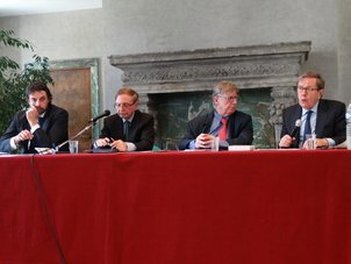Round Table on “Lessons learned from water conflicts for a future of cooperation and peace”7/4/2017  Hydroaid was invited to take part in a Round Table organized by the “Maison d’Italie”, one of the students’ halls of residence of the “Cité Internationale Universitaire de Paris”, the international university campus established in 1925 closely linked to Paris universities. The panel of speakers included Ambassador Luigi Cavalchini, President of Hydroaid; Ambassador Giancarlo Leo, former Representative of Italy to UNESCO and Mr Gian Luca Beruto, who recently joined the Hydroaid team. The discussion was moderated by prominent Italian correspondent, Alberto Toscano. The Round Table took place on 25 March and was introduced by Mr. Roberto Giacone, Director of the “Maison d’Italie”. Ambassador Giandomenico Magliano, Italian Ambassador in Paris, formally opened the discussion. The Round Table focused on a crucial topic: “Lessons learned from water conflicts for a future of cooperation and peace”. The debate gave an overview of water-related conflicts throughout history, focusing on water disputes in certain regions of the world such as the Middle East and Africa, where several hot spots reveal how much water is a fundamental resource for human development. Over the last sixty years water has been the cause of 40% of conflicts. The situation is extremely complex. Although the surface of the globe is made up of 71% of water, less than 3% of the reserves is drinking water, 2.2% of which is trapped in glaciers or contained in aquifers. Less than 1% of the water on earth is then left to meet the needs of 7 billion human beings, as well as animal and plant species. Nine countries share 60% of the world's water supply, 28 suffer from chronic water shortages and 80 are subject to one-time shortages. By 2050, at least one person in four will live in places where the lack of drinking water is chronic or recurrent while climate change will aggravate these difficulties, particularly in the water basins common to several countries. These considerations imply respect for a fundamental principle: to make the best use of water resources in respect of both environmental sustainability and equitable sharing. The panelists also discussed the most important challenges related to water management, particularly the links between water resources; problems concerning its management, use and access; and migratory flows and conflicts. In the current international context where we are witnessing the largest migration flows since the Second World War – the volume of migrants has in fact tripled in the last thirty years – and water crises are highlighted in the reports of several international agencies and organizations, the importance of understanding the links between water resources and migration flows has become indispensable. Water scarcity is becoming increasingly problematic also because of the climate changeaffecting the planet. The problem of population displacement as a result of climate change is increasingly seen as one of the major crises of our time; although to date these concerns tend to be viewed as peripheral. However, the assumed size of the phenomenon, with a possible prediction of one billion displaced persons in the future, has now placed the problem among the most burning issues on the world political agenda. The only way to deal with these concerns more constructively and strategically, with the future in mind, is through the promotion and creation of instruments of cooperation in the field of water management. Cooperation – at governmental, regional, and inter-agency levels – must be placed, therefore, at the core of current debates with a view to encouraging effective and shared public policies aimed at a more balanced water resources management respectful of fundamental human rights. There are already a number instruments whose purpose is to promote cooperation in this field – the Nile Basin Initiative and the Agreement between Israel, Jordan and the Palestinian National Authority to combat the contraction of the Dead Sea and provide safe drinking water in the region – but it is crucial to understand that these instruments are likely to be conceived with obvious intrinsic limitations in terms of effectiveness if the approaches that lead to their formulation do not take into account an effective conversion of perspective, with strong focus on the concepts of sustainability and respect of fundamental human rights, aimed at a shared and equitable water resource managemen
0 Comments
Leave a Reply. |
Archives
April 2024
Categories |
Location
|
Contact Us
|

 RSS Feed
RSS Feed